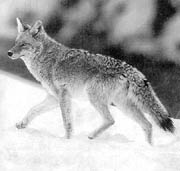
TOM SMART/Associated Press
You could get around the problem by calling it a prairie wolf or a brush wolf except it's not really a wolf.
p. A13.
Pronounced differences
Do Canadians call it a 'ky-OAT-ee' or a 'KY-oat'? Grrr!
Katherine Barber
Comment
Canadians have a remarkable quirk when it comes to spelling and pronunciation variants: Each Canadian believes that his or her linguistic practice is the "true Canadian" one and anything else must be wrong — and probably American to boot.
So I have had people who pronounce "missile" to rhyme with "missal" tell me, outraged, that those other Canadians who rhyme it with "mile" are obviously wrong and have sold out to those nefarious Americans. Of course, the truth is that "missal" is the only pronunciation used by Americans, whereas the other pronunciation is used by the British. But Canadians don't usually like to let the truth interfere with a little zealous anti-Americanism.
The recent flurry of controversy that has arisen in Toronto about how to pronounce the word, "coyote," prompted by recent sightings of the animal in the city's High Park, is a classic example of this, with the added fillip of a dash of Western anti-Ontarianism.
Torontonians, whose only previous acquaintance with the animal was seeing it flattened by a cartoon anvil, not surprisingly call it a "ky-OAT-ee." Westerners, who have lived with the animal longer and traditionally have more commonly said "KY-oat" or even KY-oot," (a northern Alberta variation, my brother assures me) may be prompted to launch into a spate of righteous indignation about Ontarians' supposed ignorance, and, worse, their supposed susceptibility to American influences, whereas Westerners are much more impervious to this and can keep true Canadianess alive.
Being a Westerner myself, I too say "KY-oat." But I like to take a more dispassionate view. Perhaps we should look into the facts of the case. Just who does say "ky-OAT-ee"? Is "KY-oat" more "truly Canadian" than "ky-0AT-ee"? (One of my colleagues at the Canadian Oxford Dictionary admitted to me that he had always thought that "KY-oat" was the "weird pronunciation," and probably American).
The animal's name is ultimately derived from Nahuatl, the language spoken by the Aztecs, for whom the crafty canine was a "coyotl." Reviving this version of the word might solve all our problems. The fact that it no longer exists can be blamed on the Spanish speakers of Mexico, who were unable to pronounce the string "tl" at the end of a word and thus transformed it into the three-syllable "coyote," which is what the English speakers in the South-Western United States borrowed from them in the early 1800s.
It is unclear how the two-syllable variant arose from this, but it is analogous to what happened to the word "chocolate" as it passed into English from the Nahuatl "chocolatl" via Spanish "chocolate." The fact is that for "coyote" all American dictionaries give both pronunciations, some of them with the "KY-oat" version first.
Dear God, this means that both pronunciations are American! Now what do we do if we want to be "truly Canadian"? Well, of course they're both American. Where else would we get a Mexican Spanish word for a native animal from? It's hardly likely to have come into Canadian English via Britain, or to have leapfrogged right over the United States to land in Canada untarnished. We could of course also ask the philosophical question as to why it would be better if it had come from Britain, but the point is moot.
Now, the coyote does go by other names, such as "prairie wolf or brush wolf," which would avoid the pronunciation problem but incur the wrath of zoologists who would point out that it is not a wolf. Perhaps a more uniquely Canadian solution would be to revive the words "mishagunis" and "togony" adapted by English speakers such as the explorer John Palliser from Algonquian names for the animal in the 1800s. Good luck if you wish to try this.
It is hardly the environmentally correct thing to suggest that we might enlist the services of a handy roadrunner to ensure that all of Toronto's coyotes are hoist with their own petard (in the cartoon version it would be Acme Petard Company) and thus spare us the necessity of talking about them at all.
So perhaps we should take the tolerant Canadian view and say "You say KY-oat and I say ky-OAT-ee; let's call the whole thing … legitimate pronunciation variation." Try setting that to a Broadway tune.
Katherine Barber is the editor-in-chief of the Canadian Oxford Dictionary and was raised in Manitoba where they say "KY-oat."
![[Previous]](../previous_off.gif)
![[Enlarge]](../enlarge_off.gif)
![[Next]](../next_off.gif)